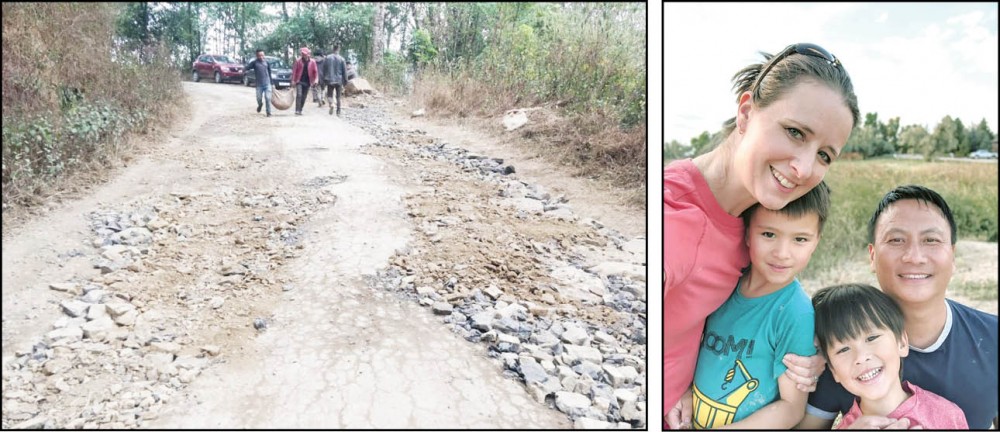(Left) The 10-kilometre stretch of road from Pfütsero to Zhavame village. (Right) Tabitha Sani and her family who helped mobilize donations from the US.

Vishü Rita Krocha
Kohima | February 26
Moved by the initiative of 25 young people from Razeba area who started crowdfunding in order to repair the deplorable 10-kilometre stretch of road from Pfütsero to Zhavame village under Phek district, Tabitha Sani, who is based out of Chicago in the United States helped mobilise a sum of Rs 2.3 lakhs towards the project. She had learnt about the initiative by reading “Building ‘road of hope’ from Pfütsero to Zhavame” which The Morung Express published in its February 4 edition.
“I saw the article in The Morung Express that was shared on Facebook. Lajü, my husband, and I read the article separately. We were immediately moved by the initiative of the ‘Road of Hope’ team and the villagers who had decided to take matters into their own hands and do something about the horrible road conditions,” she said.
When Tabitha mentioned to Lajü that she would like to help, her husband had already thought the same thing. That was when they started asking friends to join them.
Tabitha is an American, married to a Mao Naga, Lajü Sani and they also lived in Kohima for two years with their two young boys before moving back to the US again. The donors who have probably never heard of this remote place are friends and family of the couple who followed the family’s journey.
“I regularly shared about the difficulties in Nagaland, including the common issue of government money meant for bettering infrastructure (like roads, water systems, plumbing, electricity, cleanliness, etc) being pocketed rather than spending on the projects it was allocated for. I shared about our own personal joys and struggles and about friends and acquaintances with tangible, physical needs”, she recollected.
This same group of people, she said, “gave funds a number of times for needs I shared with them: helping laborers, families that needed warm clothing, and school tuition for children.”
“They must have developed a heart connection with Nagaland vicariously through our journey and stories. So, when we shared about this project they must have understood immediately what a huge undertaking it is to accomplish such a large task under such difficult conditions,” she added.
One of the donors stated “It’s wonderful when people have the confidence and passion to work toward big changes, especially when they don’t have the support of the establishment.”
The Road of Hope Core Team has also been overwhelmed by the support received from so far away. The crowdfunded project officially kick started on February 16, 2020 wherein the donors are also being updated on the progress by Tabitha.
As for Tabitha Sani, she feels this project is truly a project of Hope. “It gives me hope that the hardworking, humble attitude of the Naga people is alive and well. It gives me hope that many are choosing to do what is right—to care for the needy and to work hard with their hands. It gives me hope that even though there are many in power who choose to pocket what should be spent on the people who elected and appointed them, there are still more who are willing to stand up and make a change”, she goes on to say.
Rekha Rose Dukru, who conceptualised the idea to make this project a community effort was on the Pfütsero-Zhavame road when The Morung Express caught up with her on Friday evening. “We are so encouraged by the support received from all over. At the community level, people not less than 70-100 from Razeba area are working at the site every day,” she informed.
To the donors from the US, she said” “they will probably never use this stretch of road, but a lot of people also came forward to help after them. Their generous contributions have motivated us even when we are very tired and exhausted from working. We have to utilise this money, and judiciously use every penny.”
Undertaking this project, she articulated, has also taught them that “we can do a lot more if we are sincere.”






